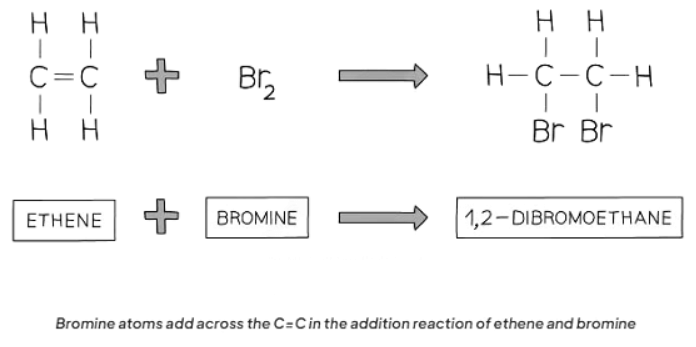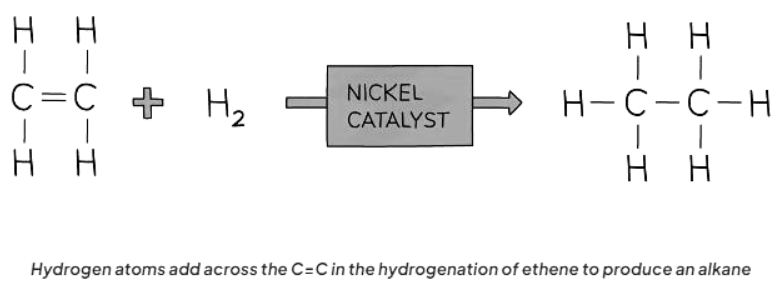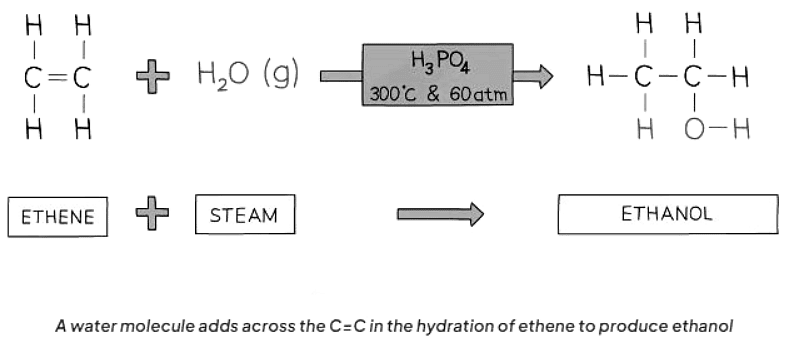Class 10 Exam > Class 10 Notes > Chemistry for GCSE/IGCSE > Addition Reactions
Addition Reactions | Chemistry for GCSE/IGCSE - Class 10 PDF Download
Addition Reactions
- Alkenes engage in addition reactions where atoms from a basic molecule add across the C=C double bond.
- An instance of such an addition reaction is observed in the interaction between bromine and ethene.

- Alkenes can also participate in addition reactions with hydrogen, resulting in the formation of an alkane.
- These reactions, known as hydrogenation reactions, typically take place at around 150ºC and employ a nickel catalyst.
- Hydrogenation reactions are utilized in the production of margarine from vegetable oils.
- Vegetable oils, being polyunsaturated molecules, are partially hydrogenated through these reactions to raise their molecular weight (Mr) and transform them into solid fats.

- Alkenes can undergo addition reactions with steam, leading to the formation of alcohols.
- This process, often referred to as hydration reaction, involves the addition of water molecules to the alkene.
- Industrially, this reaction holds significant importance for the production of alcohols.
- The reaction typically occurs under specific conditions: a temperature of approximately 300ºC, a pressure range of 60 to 70 atm, and the presence of a concentrated phosphoric acid catalyst.

Question for Addition ReactionsTry yourself:What is the name given to the addition reaction between alkenes and hydrogen?
View Solution
The document Addition Reactions | Chemistry for GCSE/IGCSE - Class 10 is a part of the Class 10 Course Chemistry for GCSE/IGCSE.
All you need of Class 10 at this link: Class 10
|
72 videos|162 docs|61 tests
|
FAQs on Addition Reactions - Chemistry for GCSE/IGCSE - Class 10
| 1. What is an addition reaction in organic chemistry? |  |
Ans. An addition reaction in organic chemistry is a type of reaction where two or more reactants combine to form a single product without the loss of any atoms. This reaction usually involves the addition of a molecule, such as a reagent or a catalyst, to the double or triple bond of an unsaturated compound.
| 2. What are some examples of addition reactions? |  |
Ans. Some examples of addition reactions include the addition of hydrogen to an alkene to form an alkane, the addition of a halogen to an alkene to form a dihalide, and the addition of water to an alkene to form an alcohol.
| 3. How do addition reactions differ from substitution reactions in organic chemistry? |  |
Ans. Addition reactions involve the addition of one or more reactants to a compound, while substitution reactions involve the replacement of one atom or group of atoms in a compound with another atom or group of atoms. Addition reactions typically result in an increase in the number of atoms in the product, while substitution reactions do not necessarily change the number of atoms.
| 4. What are the factors that influence the rate of addition reactions? |  |
Ans. The factors that influence the rate of addition reactions include the nature of the reactants, the presence of catalysts, the temperature of the reaction, and the concentration of the reactants. These factors can affect the activation energy of the reaction and the stability of the intermediates formed during the reaction.
| 5. How are addition reactions important in the synthesis of various organic compounds? |  |
Ans. Addition reactions play a crucial role in the synthesis of various organic compounds, as they allow for the formation of new bonds and the creation of complex molecular structures. These reactions are commonly used in the production of pharmaceuticals, polymers, and other important chemicals in the field of organic chemistry.
Related Searches





















